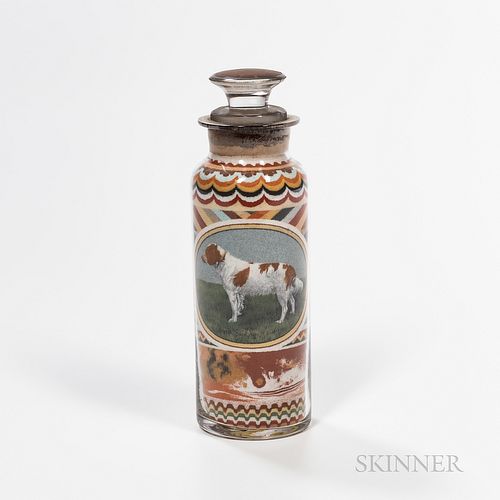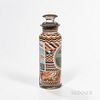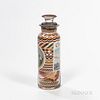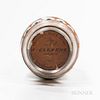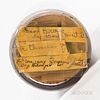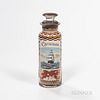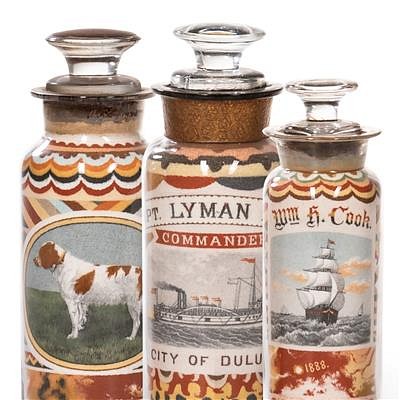Patriotic Sand Picture in a Bottle with Irish Red and White Setter Dog and "Christmas,"
Lot 1033
About Seller
Bonhams Skinner
274 Cedar Hill Street
Marlborough, MA 01752
United States
Founded over four decades ago, Bonhams Skinner offers more than 60 auctions annually. Bonhams Skinner auctions reach an international audience and showcase the unique, rare, and beautiful in dozens of categories, including the fine and decorative arts, jewelry, modern design, musical instruments, sc...Read more
About Auction
Catalog Only
By Bonhams Skinner
Nov 15, 2021 - Nov 22, 2021
Set Reminder
2021-11-15 12:00:00
2021-11-22 19:00:00
America/New_York
Bidsquare
Bidsquare : Americana online
https://www.bidsquare.com/auctions/skinner/americana-online-7867
Our November online Americana auction features an exciting variety of items for anyone with an interest in the decorative arts of historic America—passionate collectors and curious newcomers alike. Bonhams Skinner bidsquare@bonhamsskinner.com
Our November online Americana auction features an exciting variety of items for anyone with an interest in the decorative arts of historic America—passionate collectors and curious newcomers alike. Bonhams Skinner bidsquare@bonhamsskinner.com
- Lot Description
Patriotic Sand Picture in a Bottle with Irish Red and White Setter Dog and "Christmas," Andrew Clemens, McGregor, Iowa, late 19th century, multicolored sand arranged in a glass bottle, one side of the bottle depicting an Irish Red and White Setter in a grassy landscape within an oval, the other side with the inscription "Christmas" above a clipper ship, with wavy line, marbled, and geometric bands, a printed maker's label affixed to the top is inscribed "Pictured Rock Sands Put up by A. Clemens, Deaf Mute, McGregor, Iowa," ht. 8 3/4 in.
Provenance: This bottle was owned early on by Salmon Willoughby Wilder (1823-1903) and Rose True Wilder (1838-1938), of Newton Highlands, Massachusetts, great-grandparents of the consignor. Salmon Wilder had a paper mill in Lawrence. From them it descended to the consignor's grandmother Mary Louise (Wilder) Pease, of Worcester, Massachusetts, who kept the bottle on a whatnot shelf in the living room. The jar and whatnot traveled with her to Rutherford, New Jersey, where it descended to Mary's son (and the consignor's father) Richard Pease, rector of Grace Episcopal Church in Rutherford. Richard and his wife retired (with the bottle and the whatnot) to Kennebunk, Maine, and then Mrs. Pease moved to Rhinebeck, New York, where the whatnot was sold. The bottle was placed in breakfront in the dining room, where it remained until recently.
Note: A handwritten inscription on the bottom reads in part "Sand Bottle by Deaf Mute A Clemens" and appears to reference the dog and its owner, but is illegible. Another note handwritten by the consignor's grandmother Mary Pease reports that the dog pictured on the bottle belonged to Orrin Joslin of Oxford, Massachusetts, in southern Worcester County. A search reveals that an Orrin F. Joslin was indeed a resident of Oxford until his death in 1909. He is buried in the North Cemetery in that town.
Andrew Clemens was born in Dubuque, Iowa, in 1857. At the age of five he became deaf and mute after an illness. He earned his livelihood by painstakingly arranging colored sand to make pictures in glass bottles. The sand came from the naturally colored sandstone in the Pictured Rocks area of Iowa. He worked in McGregor, Iowa, and for a short time he made the pictures and exhibited his work at a South State dime museum in Chicago, Illinois.Condition
Any condition statement is given as a courtesy to a client, is only an opinion and should not be treated as a statement of fact. Skinner Inc. shall have no responsibility for any error or omission. The absence of a condition statement does not imply that the lot is in perfect condition or completely free from wear and tear, imperfections or the effects of aging. - Shipping Info
-
Please visit http://www.skinnerinc.com/services/payment-and-shipping/ for information regarding the collection of items purchased at auction.
-
- Buyer's Premium



 EUR
EUR CAD
CAD AUD
AUD GBP
GBP MXN
MXN HKD
HKD CNY
CNY MYR
MYR SEK
SEK SGD
SGD CHF
CHF THB
THB